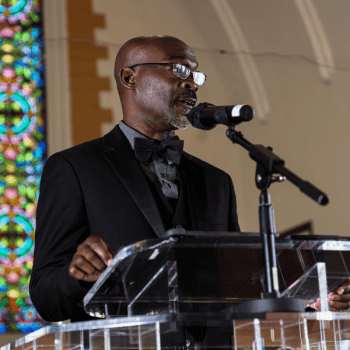This is Part Two of a three-part series of reflections on the lectionary gospel readings leading up to Advent. See the introduction to the series here.

November 14
Luke 21:5-19
Over the next couple of weeks we're trying to prepare for Advent. What obstacles lie in our way? What impedes or works against our preparations?
What obstacles lay in Jesus' way -- obstacles to people being receptive to his message and opening their minds and hearts to his teachings?
Do you think his lack of tact could have been an obstacle to people's getting with his program? We can't really leave Jesus alone for a moment in these closing chapters of Luke without his offending somebody else. After his run-in with the Sadducees last week, he immediately turned his sharp tongue on the scribes (20:45-47) and rich people (21:1-4). Everyone knows that if you want to climb the ecclesial ladder, you schmooze people with influence and money. Somewhere along the line Jesus got his communication strategies reversed -- his M.O. was purposely to offend those who held his life in their hands and persistently to befriend social losers, people who could do absolutely nothing for him. He got his "offend" and his "befriend" backward. If he had been my son, I'd have given him a piece of my mind. Mothers want their sons to outlive them after all.
But maybe his "in your face" approach was just as well. Do people who are comfortable and have all their needs met ever open their lives to God by reasoned argument and gentle persuasion? Maybe he figured he'd speak the truth, no sugar coating, and let the chips fall. Oh, he wept over the recalcitrant city (19:41-44), but then it was time to cleanse the Temple and speak the truth.
So wealth and power are two obstacles to preparing for Advent.
A third, apparently, is following false teachers (21:7-9). Jesus warns his listeners against those who teach "in his name" and then seek to invite people to place their trust, lives, and funds in their hands. "Do not go after them" (21: 8).
I can't think of anything or anyone that we would trust with our lives and funds besides Jesus, can you? I mean, preachers always accuse people of that, but they're so vague about it. What would it look like for somebody to place her trust in something besides Jesus? For someone to invest their financial assets in some cause that is against the spirit of Jesus' teachings? For a person to spend most of his time in a pursuit that brings shame to the message of Christ? We need examples. Otherwise, it's just a generalization. I call it the "hovercraft sermon" -- it hovers above life, never really convicting me of anything and never really convincing me of anything either.
What would it look like to have a misplaced sense of urgency that propels us in the wrong direction? What would it look like to feel like "I have to respond to this and I have to do it now!?" "The time is near." And for that to be completely false and take me down a path that is wrong for me or anyone else?
Another obstacle for contemporary readers might be the strangeness of apocalyptic passages. The purpose of apocalyptic passages, as a preacher friend of mine once said, can be summed up in the words of the pop song, "Hang on Sloopy, Sloopy, Hang on," recorded by The McCoys in 1965. It is a genre intended for persecuted groups that assures them, in vivid code language, of their imminent vindication through dramatic divine intervention. (See 21:12-17.)
The obstacle to Jesus' Advent in the days of the early Church was that people got so caught up in interpreting historical and natural events as signs of the end that they neglected the present time. They wouldn't have recognized Jesus if he had been standing right next to them, which, in fact and in Spirit, he was. The obstacle to preparing for Jesus' Advent today could be the same for some who pore over Nostradamus and the Left Behind series.
But for churches in countries where indifference to religion is more prevalent than persecution, maybe the loss of a sense of urgency is the obstacle to preparing for Advent. The Son of Man is coming, you say? I thought it was just the countdown of shopping days till Christmas. I thought it was the consumer spending index and a plump, white bearded man in a red suit.
In Chapters 19 through 21, Jesus covers the whole emotional spectrum in seeking to motivate Jerusalem to prepare for the coming of the Son of Man. He weeps over Jerusalem (19:41-44); he seeks to cleanse it (cleansing of the Temple 21:19:45-48); and, finally, he foretells its destruction (21:20-24).





